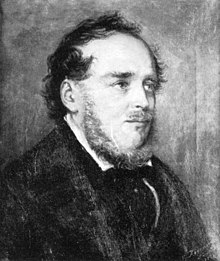Friedrich List
German economist
Georg Friedrich List (August 6, 1789 – November 30, 1846) was a German born economist and political activist. He was also a public accountant, entrepreneur, publisher, academic professor, German parliamentarian, and American diplomat. List is considered a father of modern development economics, industrial policy, pragmatic customs policy, taxation- , communication- and infrastructure theory, theory of human capital and national innovations systems.

Quotes
editOutlines of American Political Economy (1827)
edit- … I believe it to be a duty of the General Convention of Harrisburg, not only to support the wool growers and wool manufacturers, but to lay the root at the axe of the tree, by declaring the system of Adam Smith to be erroneous – by declaring war against it on the part of the American System – ...
- Letter I
- … the Union can grow powerful only by fostering the manufacturing interest. This, Sir, I think the true American political economy.
- Letter IV
- It is indeed strange to see at the same time the present Ministry of England … jealously watch to prevent every progress of other rival nations, particularly of the United States.
- Letter IX
The Natural System of Political Economy (1837)
edit- We have already observed that the fortunes or misfortunes of individuals are dependent upon the maintenance of the independence and progress of the whole nation.
- p. 33
- From the nation they draw all the benefits of civilisation, enlightenment, progress, and social and political institutions, as well as advances in the arts and sciences.
- p. 30
- Finally, a nation should not regard the progress of industries from a purely economic point of view. Manufactures become a very important part of the nation‘s political and cultural heritage.
- p. 39
- … Following these examples every responsible government should strive to remove those obstacles that hinder the progress of civilisation and should stimulate the growth of those economic forces that a nation carries in its bosom.
- pp. 42–43
- Educational facilities will be extended and better standards of morality will be established. Political institutions, too, will be improved. In this way a backward nation can develop into a progressive state.
- p. 44
The National System of Political Economy (1841)
edit- … every nation which makes no forward progress sinks lower and lower, and must ultimately fall
- p. 8
- But politics demands, in the interests of each separate nation, guarantees for its independence and continued existence, special regulations to help its progress in culture, prosperity, and power, to build its society into a perfectly complete and harmoniously developed body politic, self-contained and independent.
- Introduction, translated and reproduced in Hirst (1909), p. 291
- The nation … must sacrifice some present advantages in order to insure to itself future ones.
- Ch. 12
- It is no more than fair that England, now that she has attained the culminating point of her industrial growth and progress, should restore again to the nations of Continental Europe a portion of those productive forces which she originally derived from them.
- p. 56
- The world has not been hindered in its progress, but immensely aided in it, by England.
- p. 365
- For the more rapid the growth of a spirit of industrial invention and improvement, of social and political reform, the wider becomes the gap between stationary and progressive nations, and the more dangerous it is to remain on the further side.
- Introduction, in Hirst (1909), pp. 287–288
- The economic betterment of a nation which is at a low level of intelligence and culture, or in which the population is small in relation to the extent and productivity of its territory, is best accomplished through free trade with highly cultivated, rich, and industrious nations. In the case of such a country every restriction of trade, intended to plant manufacturing industry within its borders, is premature and injurious, not only to the welfare of mankind in general, but to the progress of the nation itself. Only when the intellectual, political, and economic education of the nation has so far advanced as a result of free trade that its further progress would be checked and hindered by the import of foreign manufactures and the lack of a sufficient market for its own goods, can protective measures be justified.
- Introduction, in Hirst (1909), p. 312
Quotes about List
edit- More people should read the works of Friedrich List. If they do, they may wonder why this turgid, confused writer—whose theory led him to predict that Holland and Denmark would be condemned to permanent economic backwardness unless they sought political union with Germany—has suddenly become a favorite of Fallows, Prestowitz and others. The new cult of List bears an uncanny resemblance to the right-wing supply-siders' canonization of the classical French economist Jean-Baptiste Say, who claimed that the economy as a whole could never suffer from the falls in aggregate demand that produce recessions.
- Paul Krugman, "Proving My Point", Foreign Affairs (1994)